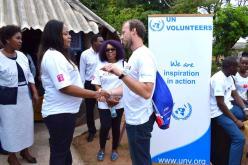As a small boy, I always loved meaningful adventure. This was part of what motivated me to apply for a UN Volunteer position with UNICEF in Zambia. Every year, the Ministry of Foreign Affairs of the Czech Republic fully funds the deployment of UN Volunteers to Czech priority countries for development cooperation. After a rigorous selection process, I arrived at Lusaka airport seven months ago from my hometown, Tišnov, despite strong resistance from my family. I was also particularly determined to find out how effective development aid was in countering development challenges in Africa.
We should work at improving aid effectiveness, but overall, aid provides a great tool for moving towards a more inclusive, equal world where social justice prevails. --UN Volunteer with UNICEF, Zambia
Although primarily based in the capital city, Lusaka, my UN Volunteer work occasionally took me out into the rural countryside, and this has really been an eye opener! On one of these trips into the countryside early in the year with my two Zambian colleagues, we followed our local guide, a representative of the local authority, to Janeiro school in Luangwa district.
UNICEF, with the support of USAID, had been implementing a project on education support for vulnerable children in the school. In the project, local community members volunteer to help identify most vulnerable households and children from these households become beneficiaries of school fees, books and uniforms.
I was the centre of attention for most of the children due to my skin colour. We played together briefly with a ball made by local materials before settling in the headteacher´s office. I noticed that the office didn't have electricity and the head teacher uses day light from the open windows for visibility. Due to recent droughts, there has been a real challenge with hydropower across most locations in Zambia, resulting in regular power blackouts.
As I began my interaction with the children to learn more about the project impact, I got recurrent stories about long distances to school (some children walking up to 10 km to get there), lack of food and water, child labour after or before school and early pregnancies, among a myriad of challenges.
On the flipside, I also experienced rich smiles, warmth, gratitude and happiness from the children. Although I felt too overwhelmed to really solve their problems, I took time to motivate them with inspirational quotes of never giving up and reaching for the skies. Curiously, they listened to me keenly and applauded regularly. We then moved to a neighbouring village to meet other children not able to attend school.
In many rural Zambian communities, people still believe that disability is a punishment from God or witchcraft. Some children with disabilities spend their whole life locked in their rooms, because their parents feel ashamed to bring them out into the communities.
One such child with a disability was Michael. He crawled by hand from their family house, his legs pulled behind him. When he saw me, he started screaming, then I tried to calm him down. I learnt that he had lived with his parents and two siblings in their small clay house since childhood. His disability was the result of polio, which left him paralysed.
Despite living only two kilometres from the UNICEF-supported Janeiro school, Michael was not able to attend the school due to lack of supportive transportation equipment. We identified his case as one of the key items to work on in the next project phase. When we were leaving, he was quite excited by the thought of possibly attending school. I left with sadness, wishing there could be more I could do to help Michael’s situation.
On the way back, I couldn’t help but ponder on the bigger picture of things. In Zambia for example, we can find several similar stories as Michael’s.
For sure, I was happy UNICEF accepted my proposal for education support to disabled children such as Michael, but what about the many more that remain unreached? I reflect on the lives of Michael’s agemates in my country, the Czech Republic, and realize a lot more needs to be done to achieve an equal, inclusive world, particularly during the ongoing COVID-19 pandemic.
When we got back on tarmac road, I drafted a message to my family titled – ‘I survived’. I logged onto Facebook to send them the message and came across anti-aid discussions on my Facebook wall. I just couldn’t help expressing my opinions.
If people who have no hope, such as Michael, can get an opportunity to attend school and hopefully escape poverty due to aid, I am convinced that we should strive to leave no one behind when analysing the impact of aid in the developing world. Yes, we should work at improving aid effectiveness, but overall, aid provides a great tool for moving towards a more inclusive, equal world where social justice prevails.

